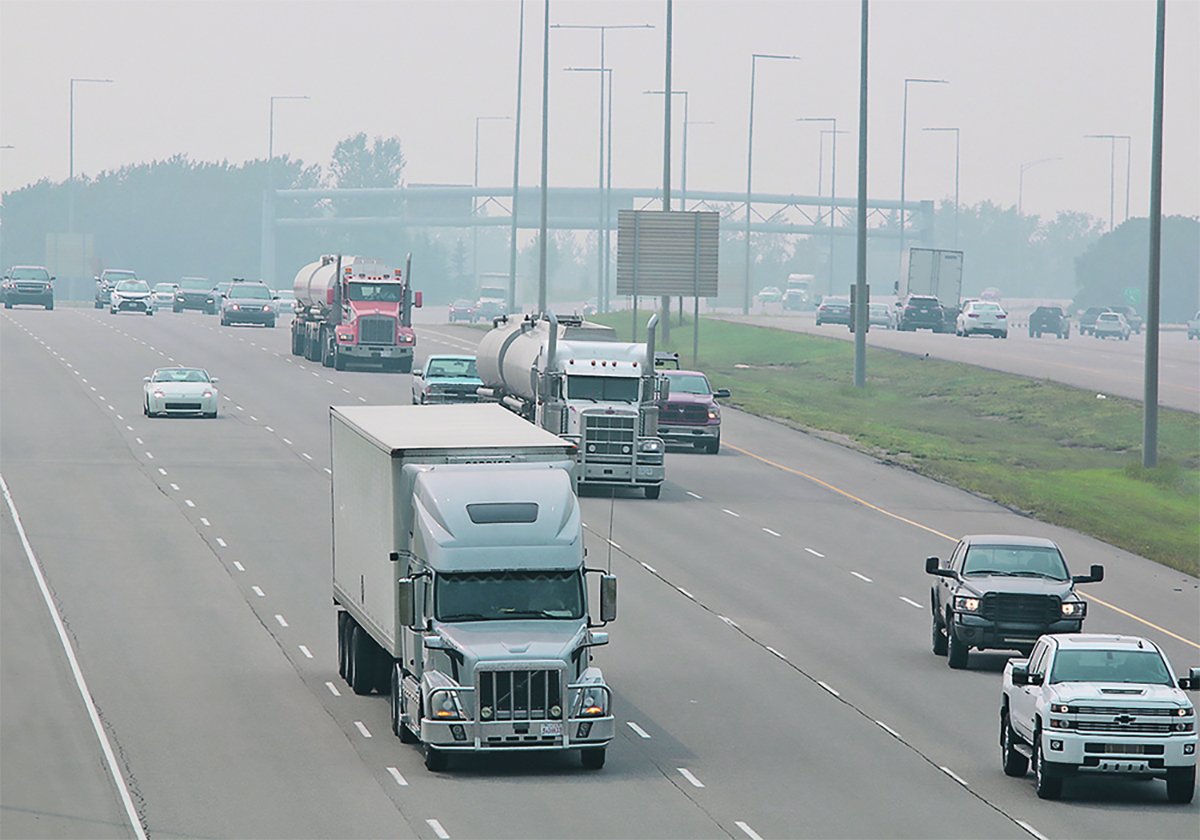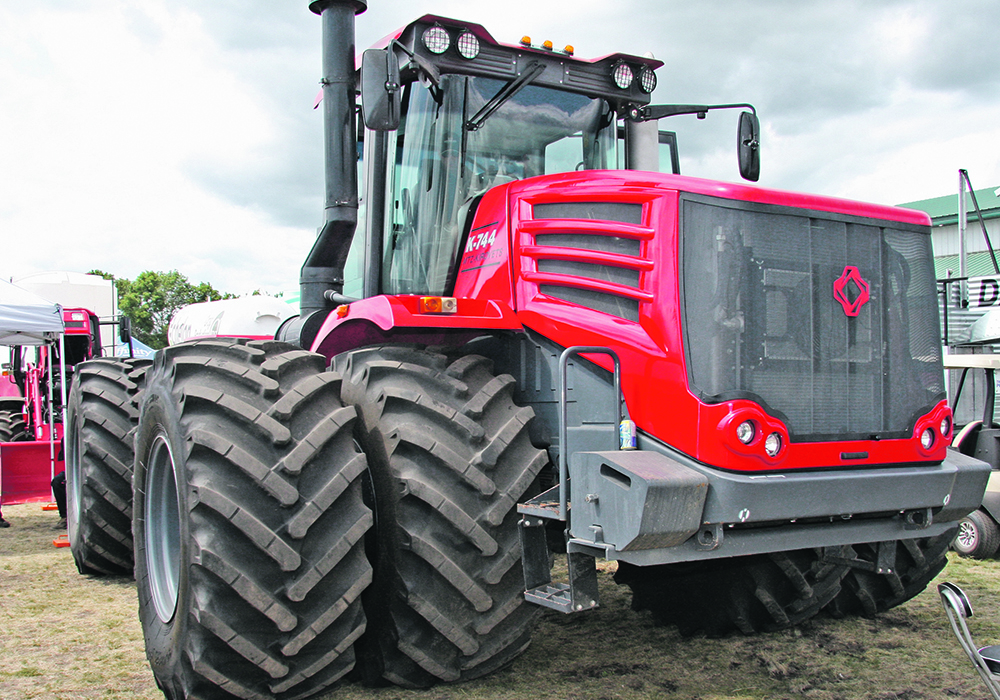North American farmers have ties to Eastern European machinery and vice versa, but war is making this challenging
Russel Douglas has a problem.
Somewhere out on the Atlantic Ocean the MTZ tractor dealer has two shipping containers filled to the roof with spare parts bound for Wadena, Sask. But it’s a long way from ocean swells to dryland Wadena.
Assuming the containers arrive in Canada in good shape, the next big wave to overcome is customs. When interviewed, Douglas still didn’t know if Russian sanctions would prevent his containers from getting into Canada. The shipment originated in Ukraine, so he’s hoping they might be given a pass.
Read Also

Alberta cracks down on trucking industry
Alberta transportation industry receives numerous sanctions and suspensions after crackdown investigation resulting from numerous bridge strikes and concerned calls and letters from concerned citizens
Douglas said it is definitely a huge order.
“I saw what was coming, so a couple months before Christmas I put in a parts order that will keep us in business for the next few years. The container company phoned to say there was a bit of space left, so I told them to keep loading parts until they touched the roof.”
He said his main business is providing parts and service to existing tractors, back to the original Belarus machines.
“If the shipment had originated in Minsk where MTZ is built, it would be stopped by the sanctions. I’d have a fight with the Canadian government. We’ll be all right for parts if we get the shipment. Plus, we re-build a lot of components. As for MTZ equipment, I think they’re probably done.
“We normally buy some Russian cultivators. We were shooting for six cultivators last year but we got none. Nobody could buy anything Russian made of steel. Russia was hoarding all the steel they could find. We knew what they were planning.
“Putin has a direct link to most of the big steel companies in North America. Also, the steel plant in Regina and Edmonton. His long arm reaches out further than most people realize. I don’t know if they can ship steel anymore to Russia or not.
“As far as Putin is concerned, 90 percent of Russians think of Putin exactly the same way we think of Trudeau out here in the West.”
From his office in Brandon, Brad Tarr runs sales for the Mazer Group, a Versatile dealer. He said the first thing that came to mind when he heard about the sanctions was the Versatile factory.
“I reached out to Versatile immediately because of sanctions on Russian banks and oligarchs and businesses,” said Tarr.
“The Versatile factory is owned by Rostselmash, so we were concerned. They assured me it was all good and it was business as usual. The tractors are built right here in Manitoba, so it’s not like they’re being brought over from Russia.”
Buhler Industries manufactures the Versatile tractor line and Farm King equipment and is majority-owned by the Russian agriculture machinery company Rostselmash. That firm bought an 80 percent stake in Buhler in 2007 and raised that to 97 percent last year.
Buhler Industries said in a statement that it “strongly opposed” the invasion and “does not condone this attack.”
“Buhler is not a Russian company. Our values are rooted in North America, where the company has been in operation since 1932.”
Buhler said it “operates with autonomy” and its “decisions are made in Canada.”
Tarr said he recognizes the company’s ownership might be an issue for some, but agriculture is an international business.
“Immediately as a Versatile dealer, you know, we see obvious connections between the Versatile brand and the Russian government.
“It won’t impact our business because we’re not a big Versatile dealer. Our dealerships are mainly New Holland. We only sell a dozen Versatile tractors a year. But there are some big Versatile dealers on the Prairies and they rely solely on that brand.
“I’m a little shocked that farmers would consider not buying a Versatile. I didn’t know farmers cared that much when buying equipment. However, we have a lot of farmers on the Prairies who still maintain their connections to the old country, to Ukraine,” said Tarr.
Larry Hertz, vice-president of the Western Equipment Dealers Association, agreed with Tarr. In an interview, Hertz said that farmers thinking about eliminating a new Versatile from their lineup should think again.
“Some people think Versatile profits go to Putin’s army. From what I understand, every dollar that Buhler Versatile generates has stayed in Canada or North America since Rostselmash took it over. Versatile is one of the Canadian companies we’re most proud of. It’s nonsense to not buy a Versatile because it’s owned by a Russian. And consider, there’s something like 300 people working there full time.
“There’s no doubt the world needs to stand up to Putin. His invasion is affecting people around the world,” said Hertz.
Since Russia’s invasion of Ukraine, Versatile has made several changes to its board to better align it with the values of the Canadian-based leadership team. Konstanin Babkin, resigned from the board. Babkin is a vocal supporter of the actions taken by the Russian government.
The company said, “These views are in stark contrast to those of the North American executive team and do not reflect the position or values of Buhler Industries.”
He was replaced by Adam Reid, the vice-president of sales and marketing.
Chief operating officer, Grant Adolphe, is the new board chair and Ossama AbouZeid has taken on the role of chairing the audit committee, replacing John Buhler, who is retiring.
Hertz added that, “Ukraine is one of the three major breadbaskets of the world. The world needs the grain and Ukraine needs the equipment we manufacture. Prairie implement manufacturers supply a lot of the seeding equipment used in that part of the world. That business is on hold for now, but that dam will break open as soon as this war is over.”
















